Private sector as a driver of a modern economy of Uzbekistan: reforms and challenges乌兹别克斯坦经济中的私营部门:改革与挑战
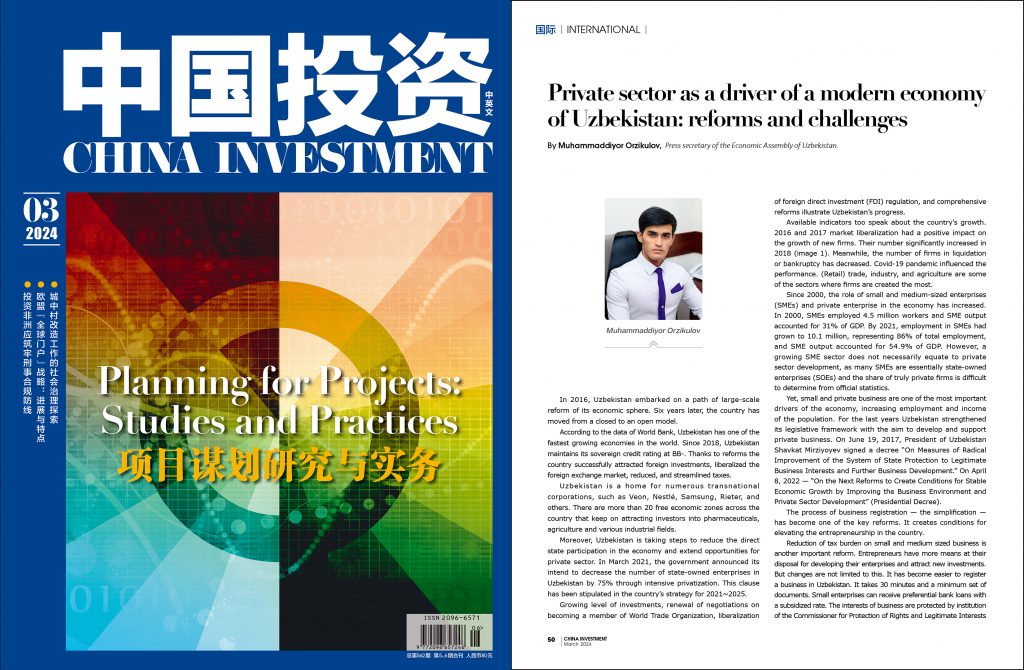
By Muhammaddiyor Orzikulov, Press secretary of the Economic Assembly of Uzbekistan.
文|穆罕默德约尔·奥尔基库洛夫(Muhammaddiyor Orzikulov) 乌兹别克斯坦经济大会新闻秘书 翻译|胡昊
导读
In 2016, Uzbekistan embarked on a path of large-scale reform of its economic sphere. Six years later, the country has moved from a closed to an open model.
According to the data of World Bank, Uzbekistan has one of the fastest growing economies in the world. Since 2018, Uzbekistan maintains its sovereign credit rating at BB-. Thanks to reforms the country successfully attracted foreign investments, liberalized the foreign exchange market, reduced, and streamlined taxes.
Uzbekistan is a home for numerous transnational corporations, such as Veon, Nestlé, Samsung, Rieter, and others. There are more than 20 free economic zones across the country that keep on attracting investors into pharmaceuticals, agriculture and various industrial fields.
Moreover, Uzbekistan is taking steps to reduce the direct state participation in the economy and extend opportunities for private sector. In March 2021, the government announced its intend to decrease the number of state-owned enterprises in Uzbekistan by 75% through intensive privatization. This clause has been stipulated in the country’s strategy for 2021~2025.
Growing level of investments, renewal of negotiations on becoming a member of World Trade Organization, liberalization of foreign direct investment (FDI) regulation, and comprehensive reforms illustrate Uzbekistan’s progress.
Available indicators too speak about the country’s growth. 2016 and 2017 market liberalization had a positive impact on the growth of new firms. Their number significantly increased in 2018 (image 1). Meanwhile, the number of firms in liquidation or bankruptcy has decreased. Covid-19 pandemic influenced the performance. (Retail) trade, industry, and agriculture are some of the sectors where firms are created the most.
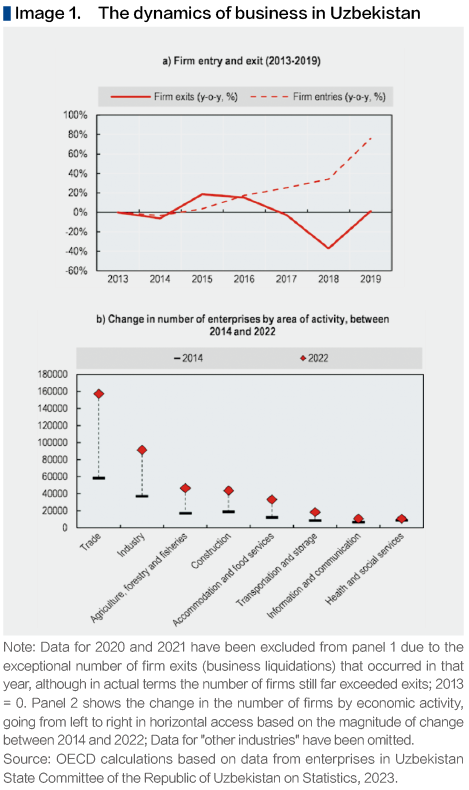
Since 2000, the role of small and medium-sized enterprises (SMEs) and private enterprise in the economy has increased. In 2000, SMEs employed 4.5 million workers and SME output accounted for 31% of GDP. By 2021, employment in SMEs had grown to 10.1 million, representing 86% of total employment, and SME output accounted for 54.9% of GDP. However, a growing SME sector does not necessarily equate to private sector development, as many SMEs are essentially state-owned enterprises (SOEs) and the share of truly private firms is difficult to determine from official statistics.
Yet, small and private business are one of the most important drivers of the economy, increasing employment and income of the population. For the last years Uzbekistan strengthened its legislative framework with the aim to develop and support private business. On June 19, 2017, President of Uzbekistan Shavkat Mirziyoyev signed a decree “On Measures of Radical Improvement of the System of State Protection to Legitimate Business Interests and Further Business Development.” On April 8, 2022 — “On the Next Reforms to Create Conditions for Stable Economic Growth by Improving the Business Environment and Private Sector Development” (Presidential Decree).
The process of business registration — the simplification — has become one of the key reforms. It creates conditions for elevating the entrepreneurship in the country.
Reduction of tax burden on small and medium sized business is another important reform. Entrepreneurs have more means at their disposal for developing their enterprises and attract new investments. But changes are not limited to this. It has become easier to register a business in Uzbekistan. It takes 30 minutes and a minimum set of documents. Small enterprises can receive preferential bank loans with a subsidized rate. The interests of business are protected by institution of the Commissioner for Protection of Rights and Legitimate Interests of Entrepreneurs. Uzbekistan abolished unscheduled inspections of small businesses. The latter are exempted from all types of liability for first-time financial and economic offenses. These are just some of the changes.
Small business is continuing to demonstrate the growth. In January-September 2019, the share of small business in GDP amounted to 57.2% (60.9% in January-September 2018). This decrease is explained by the increase in the share of large enterprises in the GDP structure. With that, in recent years, the share of small businesses has been growing in GDP steadily.
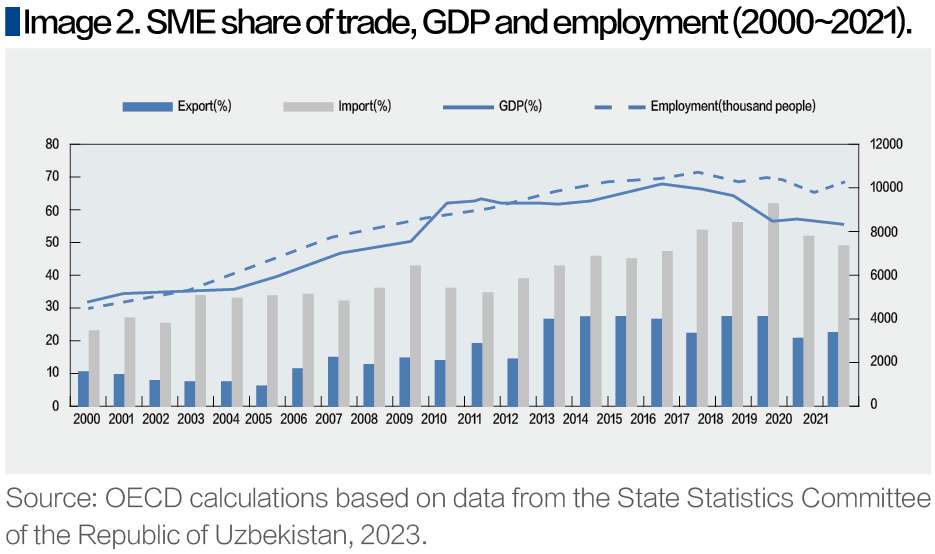
This means that in a year these small firms and enterprises produced goods and services more than a half of a total mass of all sectors (trade, construction, industry, etc.).
By contrast, the share of SMEs in the GDP of developed countries is 50~60%. In Poland -51%, Germany -53%, Finland -60%, Netherlands -63%.
Overall, in Uzbekistan SMEs play a vital role in the economy, contributing significantly to GDP and employment.
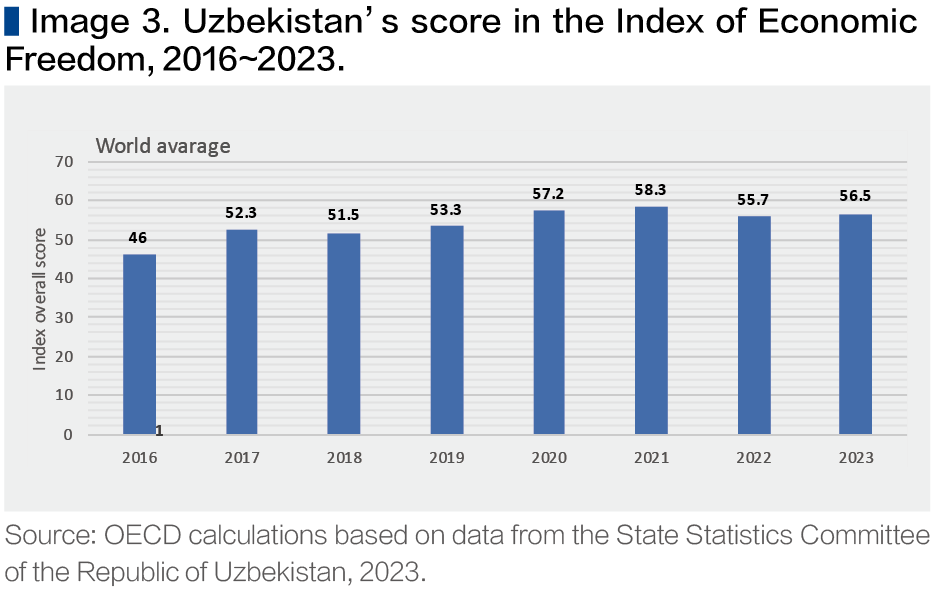
As a result of reforms Uzbekistan ranked 109th — the growth by 8 points — in the Index of economic freedom of the American research institute Heritage Foundation. The country also advanced on measures of tax burden, freedom of investment and trade, but fared worse on government spending and fiscal policy.
Now Uzbekistan intends to fill a number of gaps to further develop the private sector. The country plans to solve the problem of lack of own and borrowed financial resources. Because of it, small enterprises are unable to purchase modern and high-tech equipment. Issues related to land allotment, utility networks are being solved. Obstacles in obtaining long-term loans are being optimized. Uzbekistan is addressing the problems of insufficient development of information systems, marketing, management and logistics services; insurance companies, audit firms, trading houses, consulting offices, business centers, business incubators. Along with that, the country is reducing bureaucracy, training personnel. This all to meet the requirements of the time.
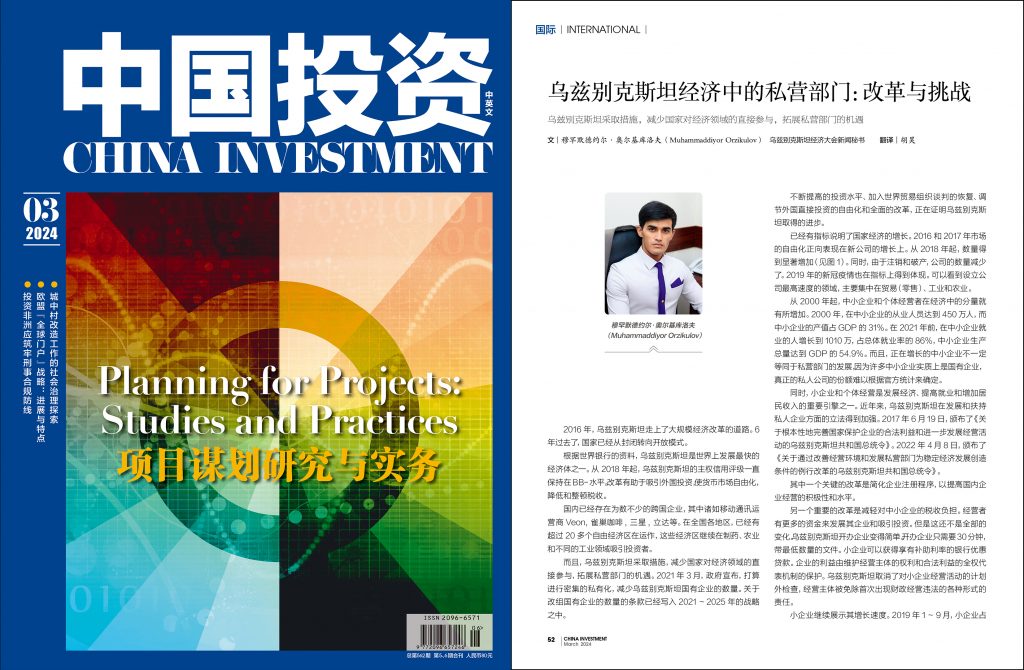
2016年,乌兹别克斯坦走上了大规模经济改革的道路。6年过去了,国家已经从封闭转向开放模式。
根据世界银行的资料,乌兹别克斯坦是世界上发展最快的经济体之一。从2018年起,乌兹别克斯坦的主权信用评级一直保持在BB-水平。改革有助于吸引外国投资,使货币市场自由化,降低和整顿税收。
国内已经存在为数不少的跨国企业,其中诸如移动通讯运营商Veon, 雀巢咖啡, 三星, 立达等。在全国各地区,已经有超过20多个自由经济区在运作,这些经济区继续在制药、农业和不同的工业领域吸引投资者。
而且,乌兹别克斯坦采取措施,减少国家对经济领域的直接参与,拓展私营部门的机遇。2021年3月,政府宣布,打算进行密集的私有化,减少乌兹别克斯坦国有企业的数量。关于改组国有企业的数量的条款已经写入2021~2025年的战略之中。
不断提高的投资水平、加入世界贸易组织谈判的恢复、调节外国直接投资的自由化和全面的改革,正在证明乌兹别克斯坦取得的进步。
已经有指标说明了国家经济的增长。2016和2017年市场的自由化正向表现在新公司的增长上。从2018年起,数量得到显著增加(见图1)。同时,由于注销和破产,公司的数量减少了。2019年的新冠疫情也在指标上得到体现。可以看到设立公司最高速度的领域,主要集中在贸易(零售)、工业和农业。
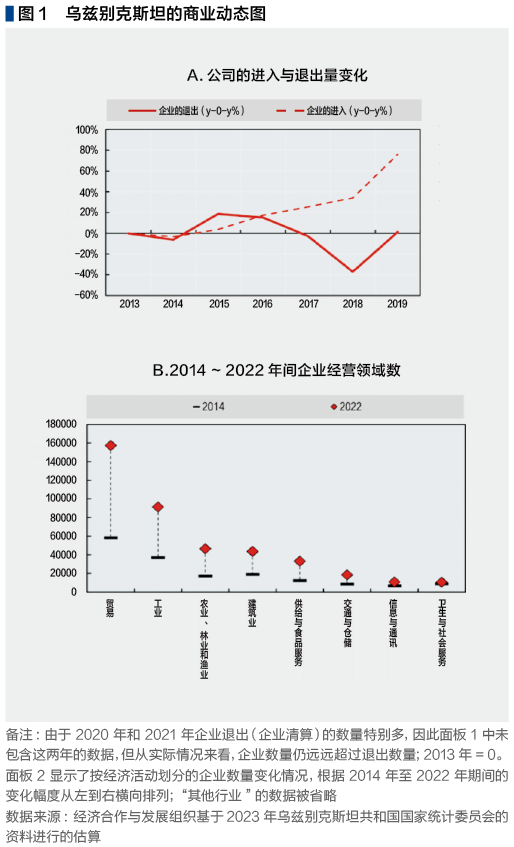
从2000年起,中小企业和个体经营者在经济中的分量就有所增加。2000年,在中小企业的从业人员达到450万人,而中小企业的产值占GDP的31%。在2021年前,在中小企业就业的人增长到1010万,占总体就业率的86%,中小企业生产总量达到GDP的54.9%。而且,正在增长的中小企业不一定等同于私营部门的发展,因为许多中小企业实质上是国有企业,真正的私人公司的份额难以根据官方统计来确定。
同时,小企业和个体经营是发展经济、提高就业和增加居民收入的重要引擎之一。近年来,乌兹别克斯坦在发展和扶持私人企业方面的立法得到加强。2017年6月19日,颁布了《关于根本性地完善国家保护企业的合法利益和进一步发展经营活动的乌兹别克斯坦共和国总统令》。2022年4月8日,颁布了《关于通过改善经营环境和发展私营部门为稳定经济发展创造条件的例行改革的乌兹别克斯坦共和国总统令》。
其中一个关键的改革是简化企业注册程序,以提高国内企业经营的积极性和水平。
另一个重要的改革是减轻对中小企业的税收负担。经营者有更多的资金来发展其企业和吸引投资。但是这还不是全部的变化。乌兹别克斯坦开办企业变得简单。开办企业只需要30分钟,带最低数量的文件。小企业可以获得享有补助利率的银行优惠贷款。企业的利益由维护经营主体的权利和合法利益的全权代表机制的保护。乌兹别克斯坦取消了对小企业经营活动的计划外检查,经营主体被免除首次出现财政经营违法的各种形式的责任。
小企业继续展示其增长速度。2019年1~9月,小企业占GDP的比重为57.2%(2018年1~9月为60.9%)。对这种降低是解释是,大企业在GDP结构中的分量有所增加。近年来,小企业在GDP中的份额在稳定地保持增长。
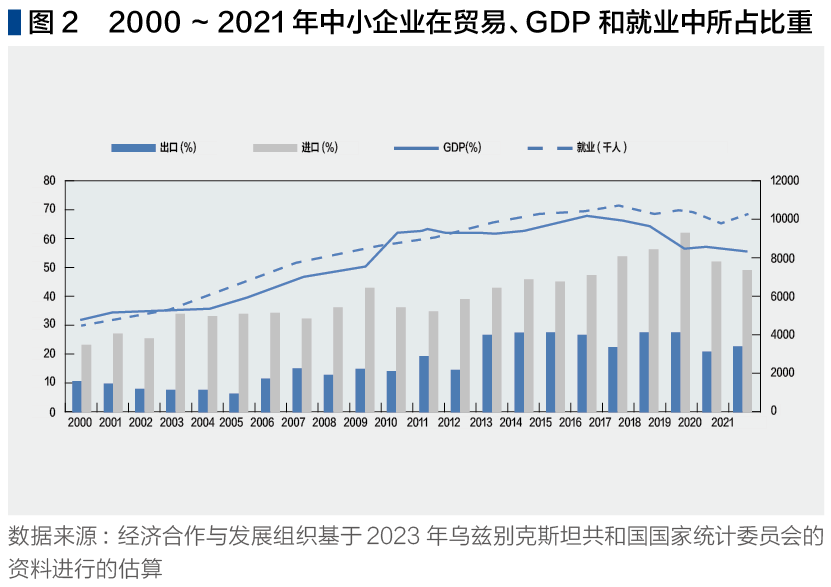
这意味着,这些小公司和小企业在一年中生产的商品和提供的服务超过了所有部门(贸易、建筑、工业等)总量的一半。
作为比较,在发达国家,中小企业的产值在GDP中占比为50~60%。波兰为51%,德国为53%,芬兰为51%,荷兰为63%。
总而言之,乌兹别克斯坦的中小企业在经济中起着至关重要的作用,为GDP和就业做出了相当大的贡献。
由于改革,根据美国研究机构传统基金会的经济自由指数,乌兹别克斯坦占109位,增加了8个百分点。国家在税收负担、贸易投资自由度等指标方面也有所迈进,但在国家支出和国库政策方面变得比较糟糕。
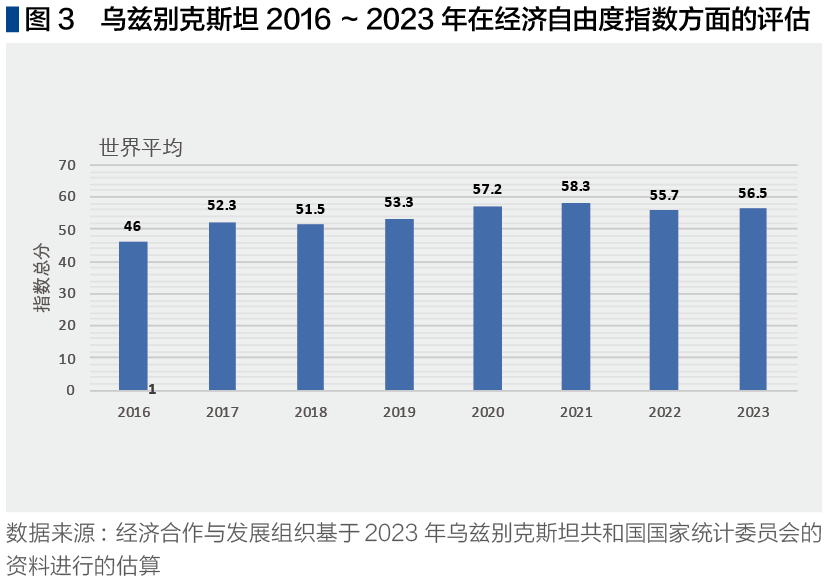
目前,乌兹别克斯坦打算填补私营部门下一步发展的空白。计划解决自有和贷款融资不足的问题,否则,小企业就不能得到现代化和高技术的设备。将要解决获取土地以及接入工程通讯网络方面的问题和困难。将要优化解决获得长期贷款方面的障碍。补齐信息体系、公证公司、贸易之家、磋商网点、商业中心、商业孵化器等方面的短板。减少官僚主义,培养符合时代要求的干部。

